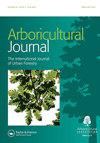Breeding bird communities within a parkland-woodland continuum: the distinctiveness of wood-pasture
Q3 Agricultural and Biological Sciences
引用次数: 1
Abstract
ABSTRACT Open-grown veteran trees and wood-pasture are landscape features of high nature conservation value in Europe. Relationships are described between vegetation structure and breeding bird communities in a landscape rich in veteran oaks. Four habitat types were examined: open parkland devoid of scrub and small trees, open-canopy wood-pasture with a complex structure, closed-canopy semi-natural woodland, and closed-canopy managed woodland. Numbers of bird species, bird diversity and numbers of individual songbirds were consistently lowest in parkland. Species composition of bird communities in parkland was strikingly different to that in all other sites and the species composition of open-canopy wood-pasture was distinct from that of closed-canopy woodland. Differences in bird communities between sites were associated with differences in vegetation structure, notably the density of vegetation in the field and shrub layers. The density of veteran trees (>100 cm dbh) had little measurable effect on the characteristics of the bird communities. Open-canopy wood-pasture, with open-grown trees and complex low vegetation, including scrub, supports bird communities that complement those in closed-canopy woodland and delivers conservation benefits through its relatively high habitat heterogeneity. Rewilding, and even the spread of ash dieback, offers opportunities for creating more open-canopy grazed woodland in western Europe.在公园-林地连续体中繁殖鸟类群落:森林牧场的独特性
开放生长的古树和森林牧场是欧洲具有较高自然保护价值的景观特征。描述了丰富的老橡树景观中植被结构与繁殖鸟类群落之间的关系。研究了四种生境类型:无灌丛和小乔木的开放公园地、结构复杂的开放冠层林地、封闭冠层半自然林地和封闭冠层管理林地。鸟类种类数量、鸟类多样性和鸣禽个体数量均在公园地最低。公园地鸟类群落的物种组成与其他样地明显不同,开放冠层的林场与封闭冠层的林场鸟类群落的物种组成明显不同。不同地点鸟类群落的差异与植被结构的差异有关,特别是在野外和灌木层的植被密度。老树密度(bb0 ~ 100 cm dbh)对鸟类群落特征影响不大。开放冠层的森林牧场,有开放生长的树木和复杂的低矮植被,包括灌木,支持鸟类群落,补充封闭冠层林地的鸟类群落,并通过其相对较高的栖息地异质性提供保护效益。野生化,甚至白蜡枯梢的传播,为在西欧创造更多的开放式林冠放牧林地提供了机会。
本文章由计算机程序翻译,如有差异,请以英文原文为准。
求助全文
约1分钟内获得全文
求助全文
来源期刊

Arboricultural Journal
Agricultural and Biological Sciences-Agronomy and Crop Science
CiteScore
2.40
自引率
0.00%
发文量
28
期刊介绍:
The Arboricultural Journal is published and issued free to members* of the Arboricultural Association. It contains valuable technical, research and scientific information about all aspects of arboriculture.
 求助内容:
求助内容: 应助结果提醒方式:
应助结果提醒方式:


